In this article, we’ve compiled the best plant-based protein sources found in nature, offering you a diverse array of nutritious options to enhance your vegan or vegetarian diet.
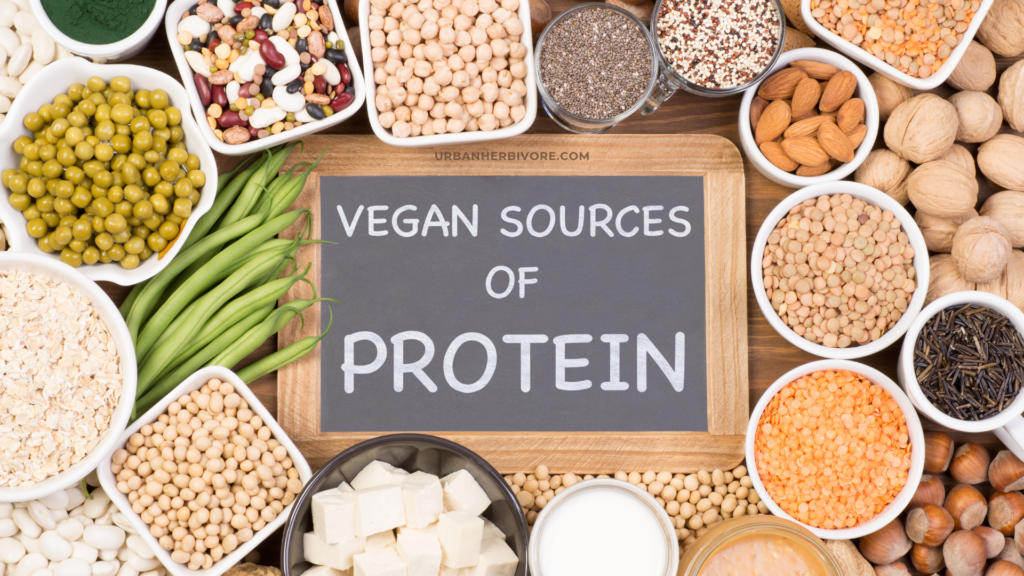
In recent years, the popularity of plant-based diets has soared, driven by growing awareness of the health benefits and environmental impact of our food choices. One of the most common concerns for those new to a vegan or vegetarian lifestyle is ensuring adequate protein intake.
Fortunately, the plant kingdom offers a wide variety of protein-rich foods that are not only nutritious but also delicious and versatile. In this blog post, we’ll explore the top 20 plant-based protein sources, highlighting their nutritional benefits and how to incorporate them into your meals.
Here are 20 excellent plant-based protein sources:
- Seitan – 25 grams of protein per 3.5 ounces (100 grams)
- Tempeh – 19 grams of protein per 3.5 ounces (100 grams)
- Lentils – 18 grams of protein per cup (cooked)
- Chickpeas – 15 grams of protein per cup (cooked)
- Black Beans – 15 grams of protein per cup (cooked)
- Edamame (Soybeans) – 17 grams of protein per cup (cooked)
- Tofu – 15 grams of protein per 3.5 ounces (100 grams)
- Quinoa – 8 grams of protein per cup (cooked)
- Hemp Seeds – 10 grams of protein per 3 tablespoons
- Chia Seeds – 5 grams of protein per 2 tablespoons
- Pumpkin Seeds – 9 grams of protein per 1 ounce (28 grams)
- Peanuts – 7 grams of protein per 1 ounce (28 grams)
- Almonds – 6 grams of protein per 1 ounce (28 grams)
- Nutritional Yeast – 8 grams of protein per 2 tablespoons
- Spirulina – 8 grams of protein per 2 tablespoons
- Oats – 6 grams of protein per 1/2 cup (dry)
- Green Peas – 9 grams of protein per cup (cooked)
- Amaranth – 9 grams of protein per cup (cooked)
- Farro – 6 grams of protein per 1/2 cup (cooked)
- Sunflower Seeds – 6 grams of protein per 1 ounce (28 grams)
These protein sources are versatile and can be easily incorporated into a variety of plant-based meals.
Let’s dive deeper into each one of them.
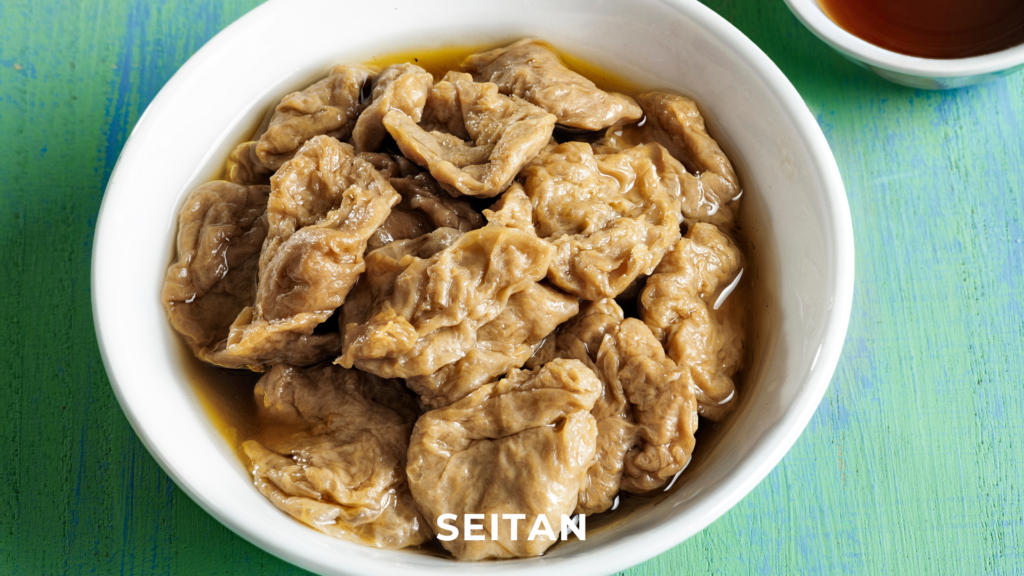
1. Seitan
25 grams of protein per 3.5 ounces (100 grams)
Seitan, often called “wheat meat,” is made from gluten, the protein in wheat. With a whopping 25 grams of protein per 3.5 ounces, seitan is a powerhouse for plant-based diets. It’s incredibly versatile and can mimic the texture of meat in many dishes, making it a popular choice for vegans and vegetarians. However, those with gluten sensitivities or celiac disease should avoid it. Seitan absorbs flavors well, making it perfect for stir-fries, sandwiches, and even grilled dishes.

2. Tempeh
19 grams of protein per 3.5 ounces (100 grams)
Tempeh is a traditional Indonesian food made from fermented soybeans. It packs 19 grams of protein per 3.5 ounces, making it an excellent protein source. The fermentation process also gives it a slightly nutty flavor and a firm texture, which can be sliced, crumbled, or marinated. Tempeh is also rich in probiotics, which promote gut health. It’s a great addition to salads, stir-fries, and sandwiches, offering both nutrition and texture.
I love to cook it with some Mojo marinade (like the Goya one). The citrus flavoring gives it a juicy, tangy taste.
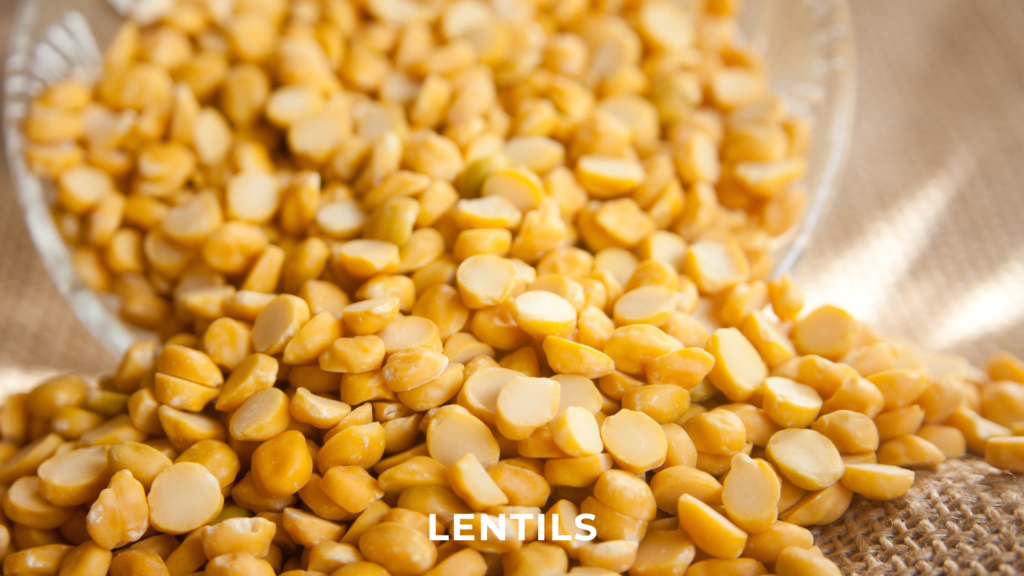
3. Lentils
18 grams of protein per cup (cooked)
Lentils are a staple in many plant-based diets, providing 18 grams of protein per cup when cooked. They are rich in fiber, iron, and folate, making them a nutritious addition to any meal. Lentils are incredibly versatile, used in soups, stews, salads, and even veggie burgers. They come in various colors, including brown, green, red, and black, each offering a slightly different texture and flavor profile.
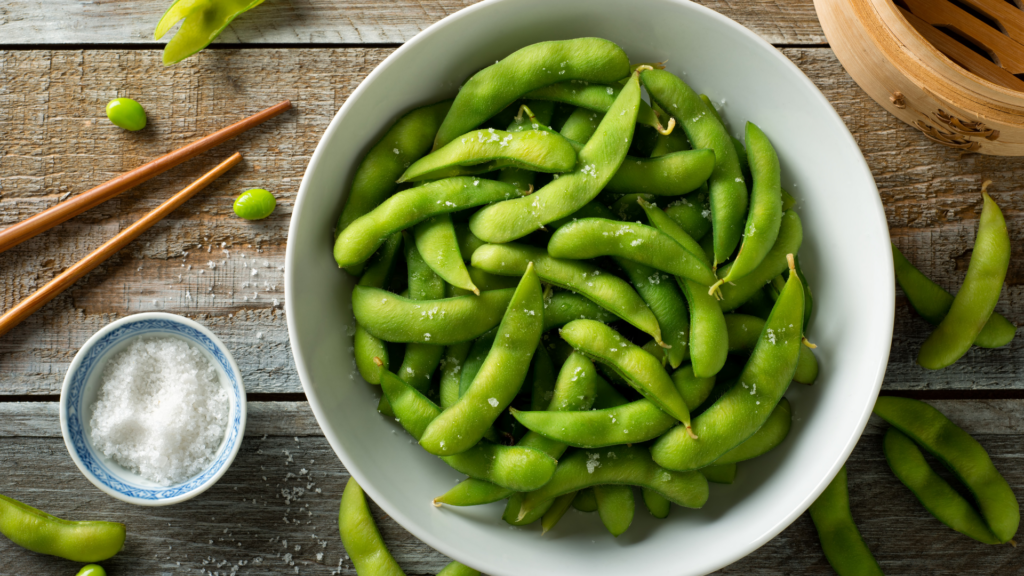
4. Edamame (Soybeans)
17 grams of protein per cup (cooked)
Edamame, or young soybeans, provide 17 grams of protein per cooked cup. These tender beans are not only high in protein but also rich in essential amino acids, making them a complete protein source. Edamame is often served as a snack or appetizer, lightly salted, and steamed in the pod. They can also be added to salads, stir-fries, and grain bowls for a protein boost.
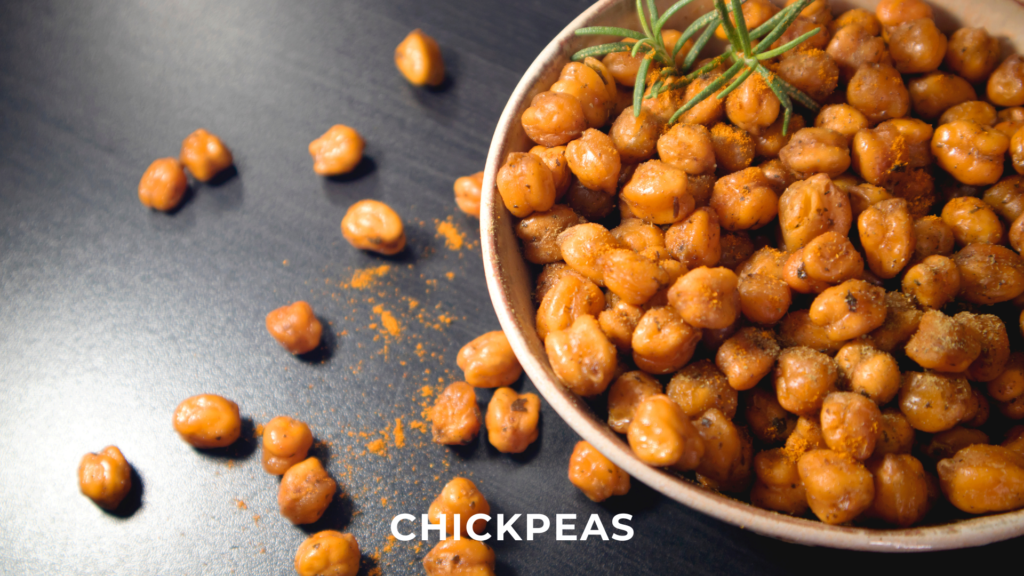
5. Chickpeas
15 grams of protein per cup (cooked)
Chickpeas, also known as garbanzo beans, offer 15 grams of protein per cooked cup. These legumes are not only high in protein but also rich in fiber, vitamins, and minerals. Chickpeas are incredibly versatile; they can be roasted for a crunchy snack, mashed into hummus, or added to salads and stews. Their mild, nutty flavor makes them a favorite in many cuisines around the world.
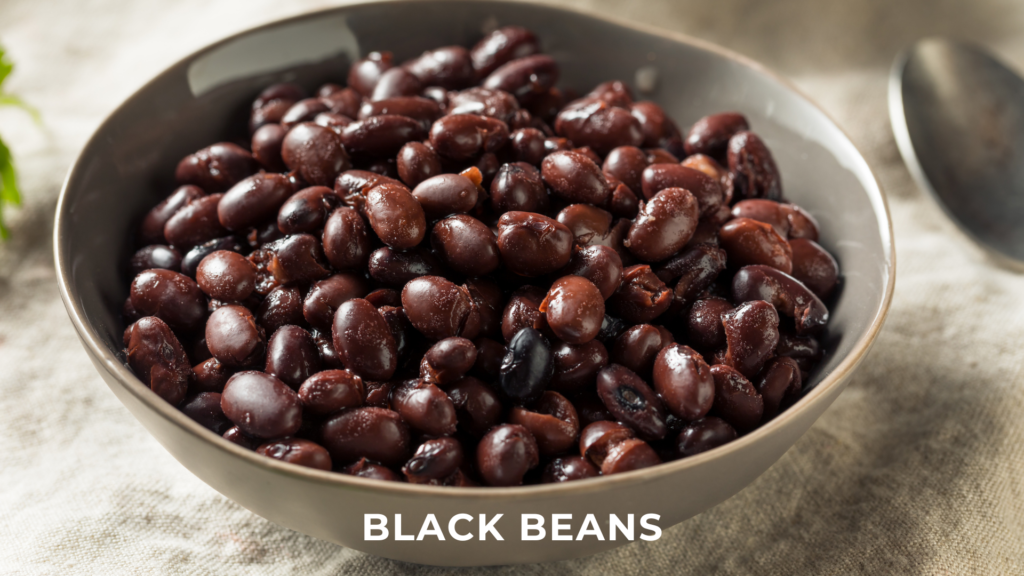
6. Black Beans
15 grams of protein per cup (cooked)
Black beans are another excellent plant-based protein source, with 15 grams per cooked cup. They are high in fiber and antioxidants, promoting heart health and aiding digestion. Black beans are a staple in Latin American cuisine, often used in dishes like burritos, tacos, and black bean soup. Their rich, earthy flavor pairs well with a variety of spices, making them a versatile ingredient in many plant-based dishes.
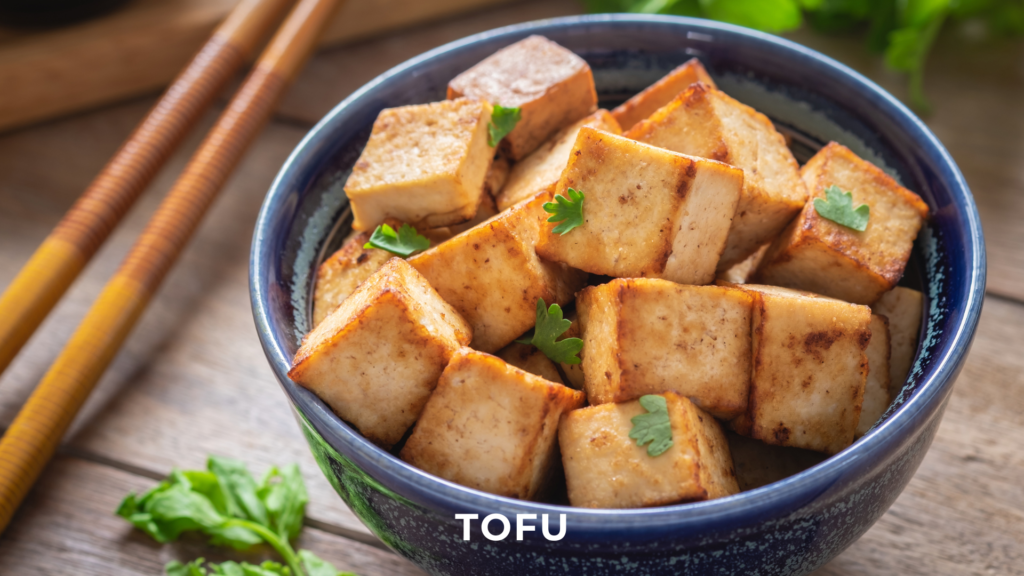
7. Tofu
15 grams of protein per 3.5 ounces (100 grams)
Tofu, made from soy milk, is a versatile and nutrient-rich protein source, offering 15 grams per 3.5 ounces. Its mild flavor and varying textures—silken, soft, firm, or extra firm—make it adaptable to a wide range of dishes. Tofu can be scrambled, grilled, baked, or blended into smoothies and sauces. It’s also an excellent source of calcium, iron, and magnesium, supporting overall health.
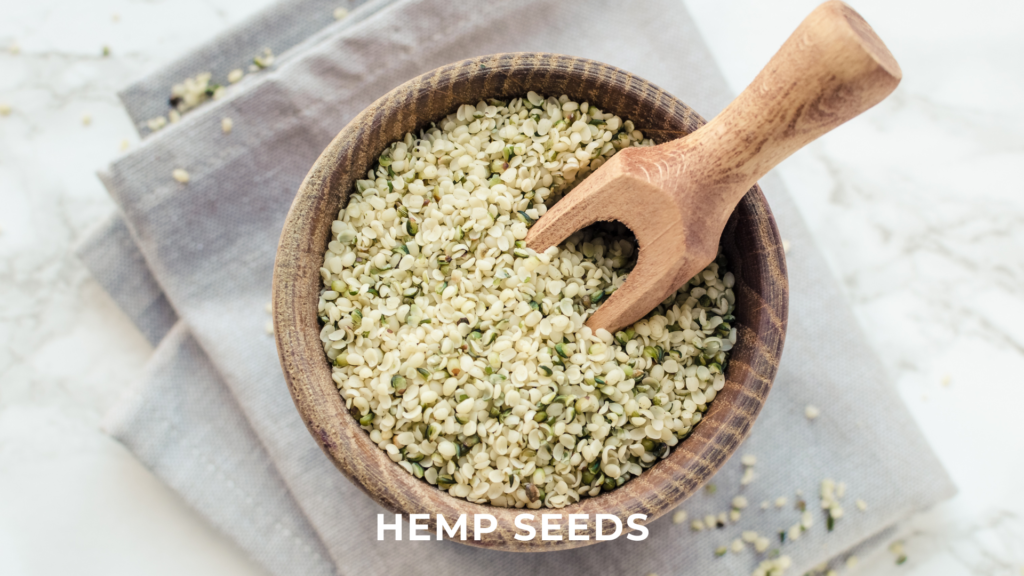
8. Hemp Seeds
10 grams of protein per 3 tablespoons
Hemp seeds offer a substantial 10 grams of protein per 3 tablespoons. They are a complete protein source and are rich in healthy fats, particularly omega-3 and omega-6 fatty acids. Hemp seeds have a mild, nutty flavor and can be sprinkled on salads, yogurt, or oatmeal, or blended into smoothies. They are also great in homemade energy bars or added to baked goods for an extra protein punch.
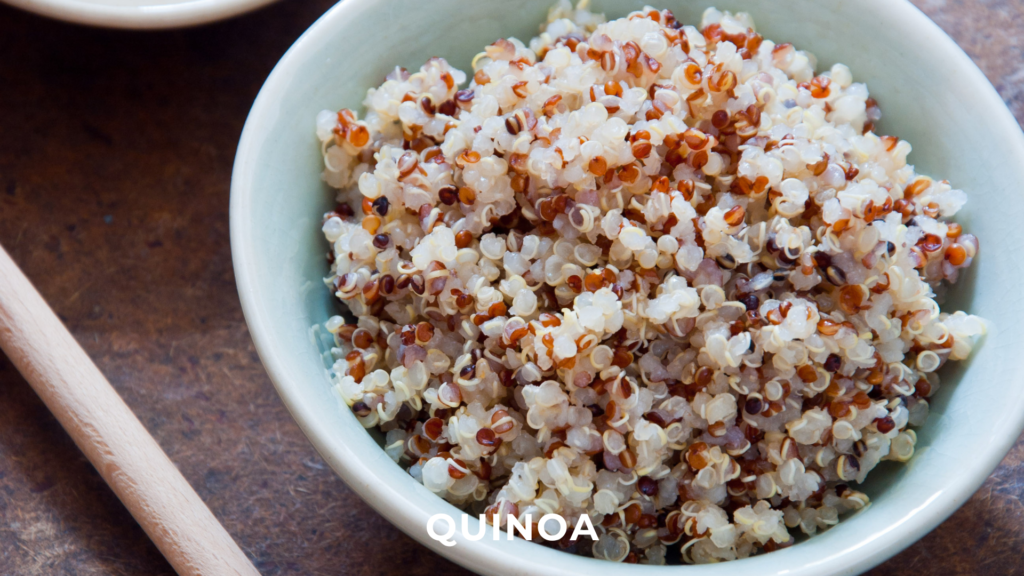
9. Quinoa
8 grams of protein per cup (cooked)
Quinoa, often considered a superfood, contains 8 grams of protein per cooked cup. Unlike most plant-based proteins, quinoa is a complete protein, providing all nine essential amino acids. It’s gluten-free and high in fiber, magnesium, and antioxidants. Quinoa’s mild, nutty flavor and fluffy texture make it a great base for salads, bowls, or as a side dish, providing both nutrition and satiety.

10. Chia Seeds
5 grams of protein per 2 tablespoons
Chia seeds provide 5 grams of protein per 2 tablespoons and are known for their high fiber content and omega-3 fatty acids. These tiny seeds can absorb up to 10 times their weight in water, forming a gel-like consistency that makes them perfect for puddings and smoothies. Chia seeds are also great for adding to oatmeal, yogurt, and baked goods, enhancing the nutritional profile of any meal.
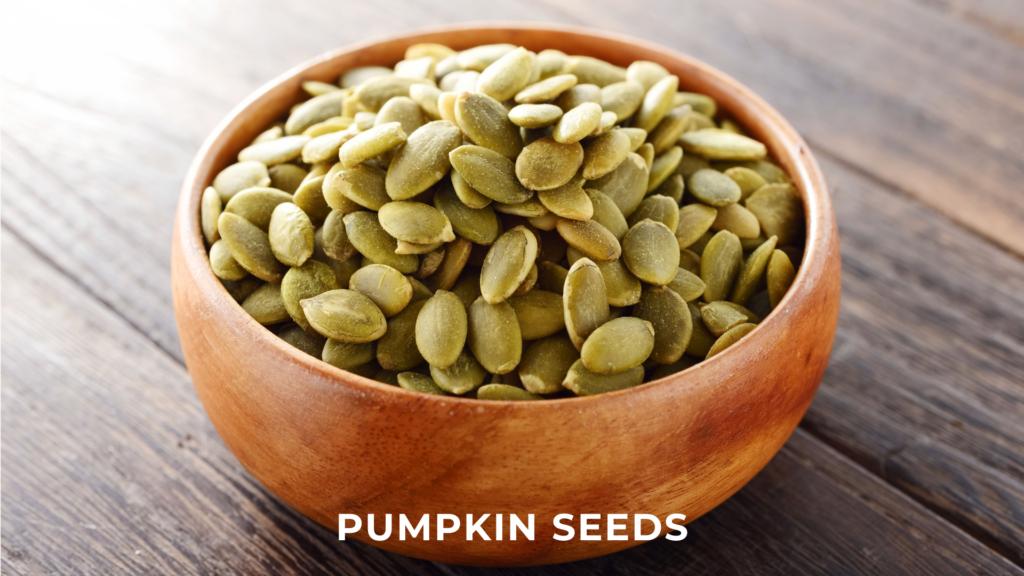
11. Pumpkin Seeds
9 grams of protein per 1 ounce (28 grams)
Pumpkin seeds, or pepitas, pack 9 grams of protein per 1-ounce serving. They are also rich in magnesium, zinc, and antioxidants. Pumpkin seeds have a crunchy texture and a slightly nutty flavor, making them a great topping for salads, oatmeal, or yogurt. They can also be enjoyed roasted as a snack or blended into pestos and sauces for added flavor and nutrition.
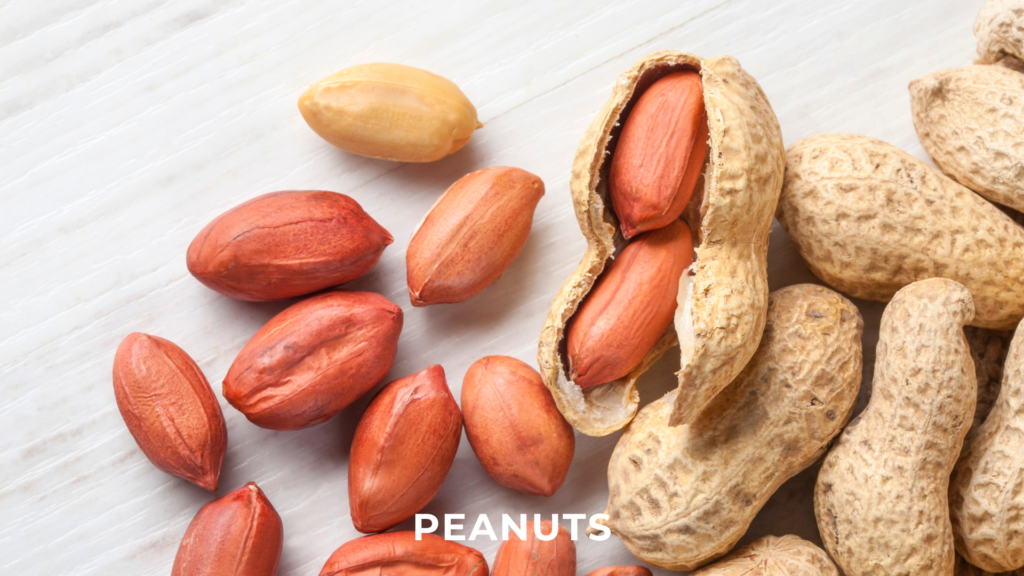
12. Peanuts
7 grams of protein per 1 ounce (28 grams)
Peanuts provide 7 grams of protein per 1-ounce serving and are also rich in healthy fats, particularly monounsaturated fats. Peanuts are incredibly versatile, enjoyed as a snack, in peanut butter, or as a base for sauces like satay. They are also a good source of biotin, copper, and niacin, which support heart and brain health. However, they are high in calories, so portion control is key.
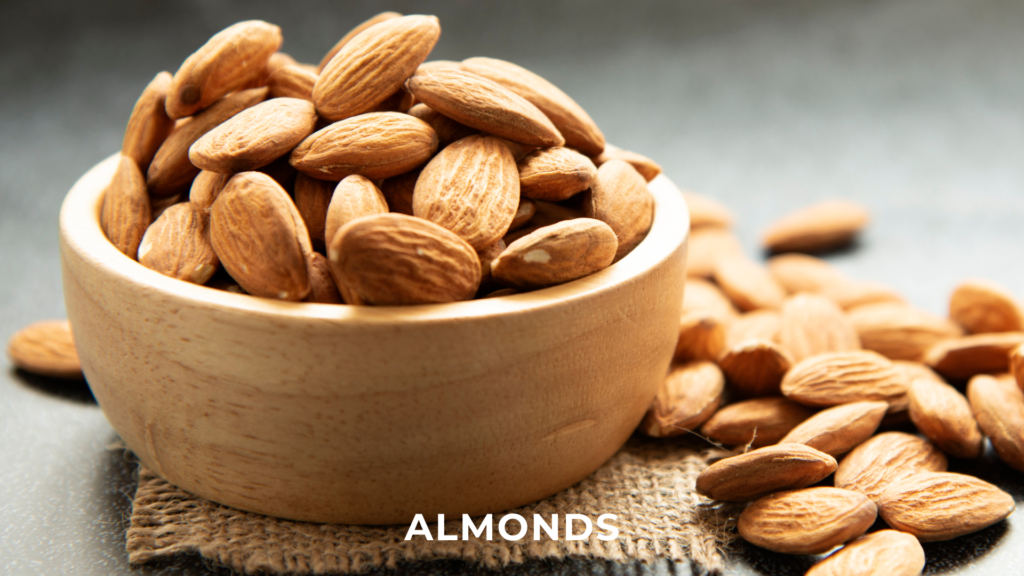
13. Almonds
6 grams of protein per 1 ounce (28 grams)
Almonds offer 6 grams of protein per 1-ounce serving, along with a good dose of healthy fats, fiber, and vitamin E. Almonds are a popular snack, but they can also be used in cooking and baking, from almond butter to almond flour. Their slightly sweet, nutty flavor makes them a favorite in both sweet and savory dishes, adding a satisfying crunch and a boost of nutrition.
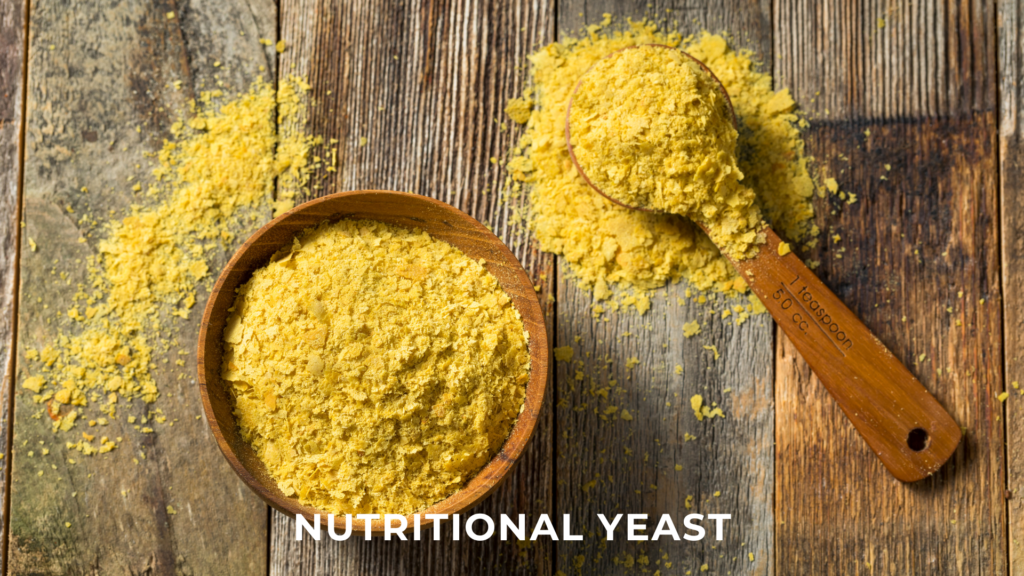
14. Nutritional Yeast
8 grams of protein per 2 tablespoons
Nutritional yeast is a deactivated yeast that offers 8 grams of protein per 2 tablespoons. It’s a complete protein and is often fortified with B vitamins, including B12, which is essential for vegans. Nutritional yeast has a cheesy, nutty flavor, making it a popular ingredient in vegan cheese sauces, soups, and as a topping for popcorn or pasta. It’s a great way to add flavor and nutrition to plant-based meals.
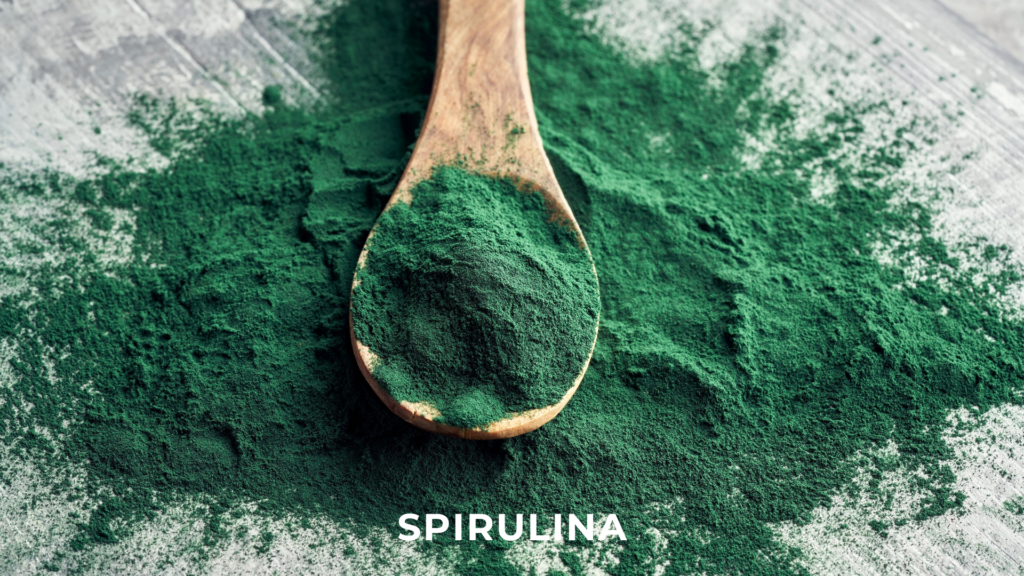
15. Spirulina
8 grams of protein per 2 tablespoons
Spirulina is a blue-green algae that provides 8 grams of protein per 2 tablespoons. It’s considered a superfood, rich in vitamins, minerals, and antioxidants. Spirulina is often sold in powder form and can be added to smoothies, juices, and even energy bars. Its slightly earthy, seaweed-like flavor is masked well in fruity or citrusy drinks, making it an easy addition to your diet.
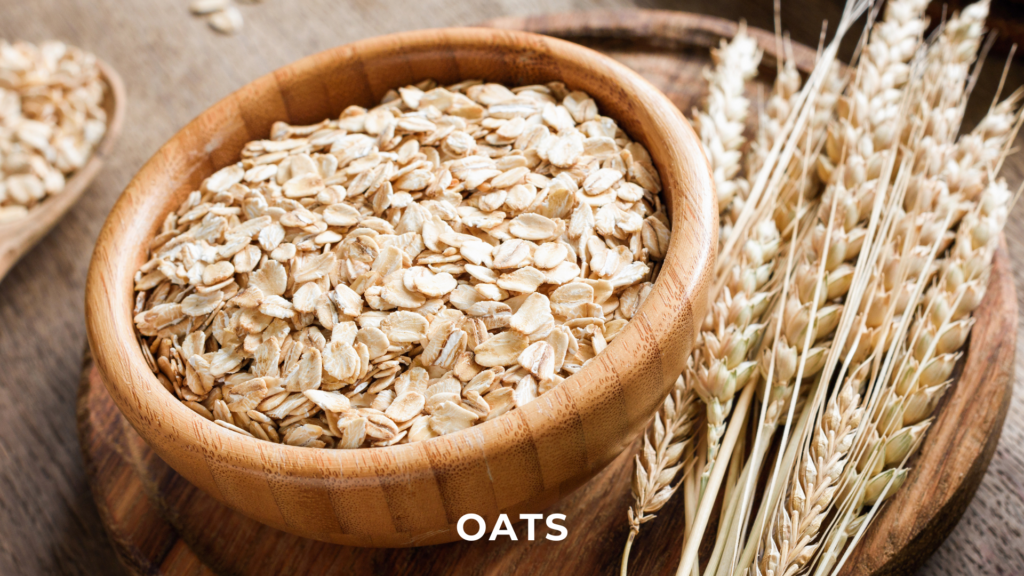
16. Oats
6 grams of protein per 1/2 cup (dry)
Oats offer 6 grams of protein per 1/2 cup when dry and are also a great source of fiber, particularly beta-glucan, which supports heart health. Oats are incredibly versatile, commonly used in breakfast dishes like oatmeal or overnight oats. They can also be blended into smoothies, baked into bars, or used in homemade granola, providing a hearty and nutritious start to the day.
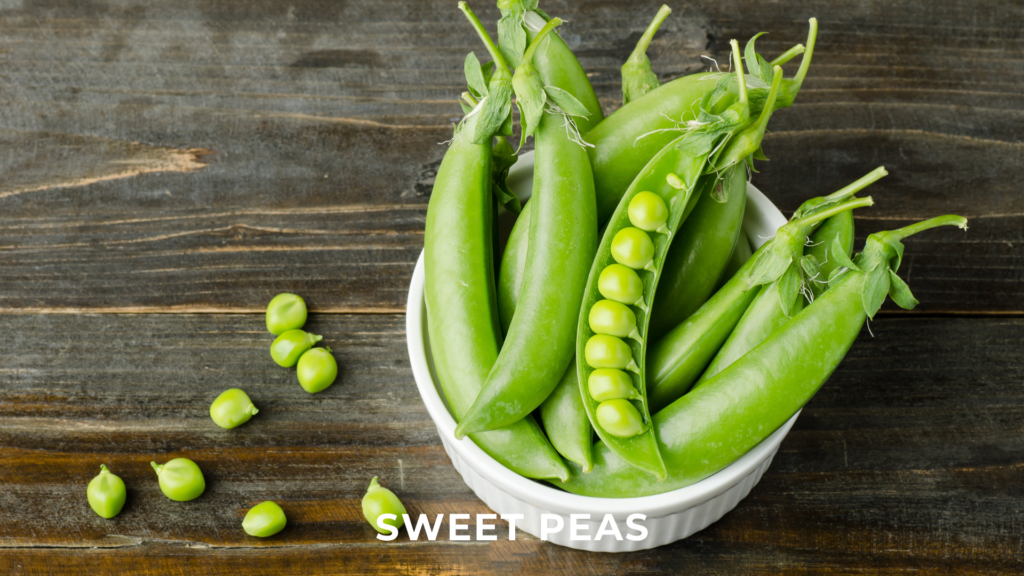
17. Green Peas
9 grams of protein per cup (cooked)
Green peas provide 9 grams of protein per cooked cup and are also rich in fiber, vitamins A, C, K, and several B vitamins. These sweet, tender legumes can be added to soups, stews, salads, and stir-fries. Green peas are also the base for pea protein powder, which is commonly used in plant-based protein supplements and bars. Their mild flavor makes them a versatile ingredient in many dishes.
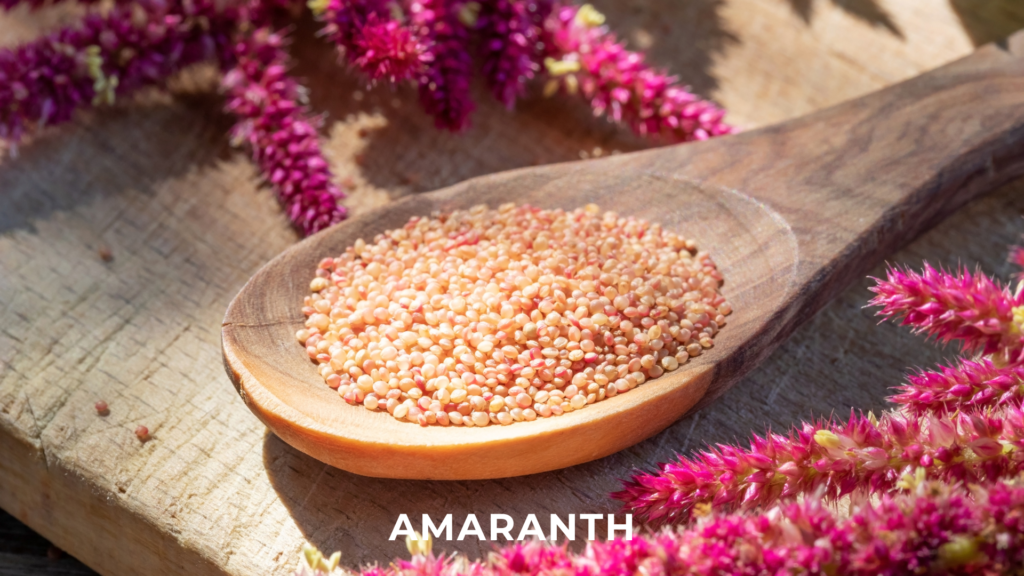
18. Amaranth
9 grams of protein per cup (cooked)
Amaranth is an ancient grain that contains 9 grams of protein per cooked cup. It’s also a complete protein and is gluten-free, making it a great option for those with gluten sensitivities. Amaranth has a slightly nutty, earthy flavor and a porridge-like texture when cooked. It can be used in place of rice or quinoa, added to soups and stews, or even popped like popcorn for a crunchy snack.
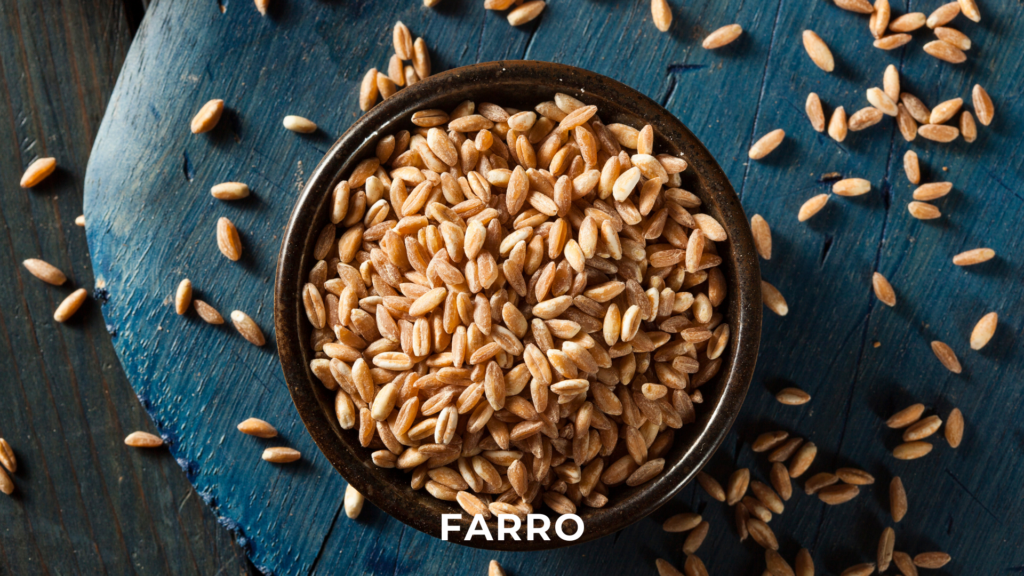
19. Farro
6 grams of protein per 1/2 cup (cooked)
Farro is an ancient wheat grain that provides 6 grams of protein per 1/2 cup when cooked. It’s also rich in fiber, iron, and magnesium, making it a nutritious choice. Farro has a chewy texture and a nutty flavor, making it a great base for salads, grain bowls, and hearty soups. It can also be used in place of rice or pasta for a protein-rich alternative.
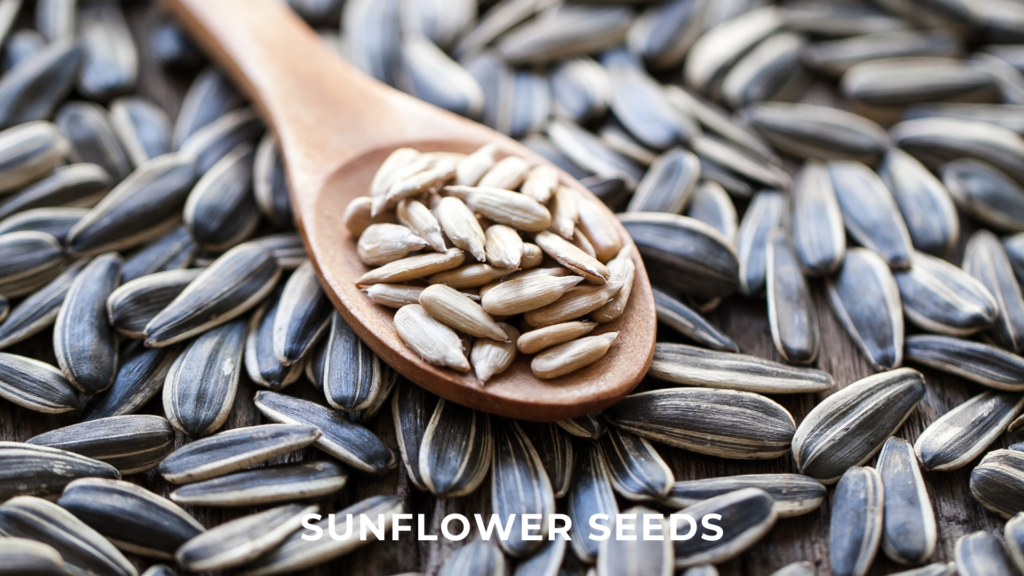
20. Sunflower Seeds
6 grams of protein per 1 ounce (28 grams)
Sunflower seeds offer 6 grams of protein per 1-ounce serving and are also high in healthy fats, vitamin E, and selenium. These seeds have a mild, nutty flavor and a crunchy texture, making them a great topping for salads, yogurt, or oatmeal. They can also be enjoyed on their own as a snack or used in baking for added texture and nutrition.
These plant-based protein sources are not only nutritious but also versatile, making it easy to incorporate them into a variety of meals to meet your protein needs on a plant-based diet.
Conclusion
Incorporating a variety of these top plant-based protein sources into your diet ensures that you meet your protein needs while enjoying a range of flavors and textures. Whether you’re new to plant-based eating or a seasoned vegan, these foods provide ample opportunities to create balanced, satisfying meals. From the hearty seitan and tempeh to the humble lentils and quinoa, plant-based proteins can easily form the foundation of a nutritious, sustainable diet that supports your health and the planet. So, next time you’re planning your meals, consider adding these protein-packed options to your shopping list and experience the benefits of plant-powered nutrition.

One Comment